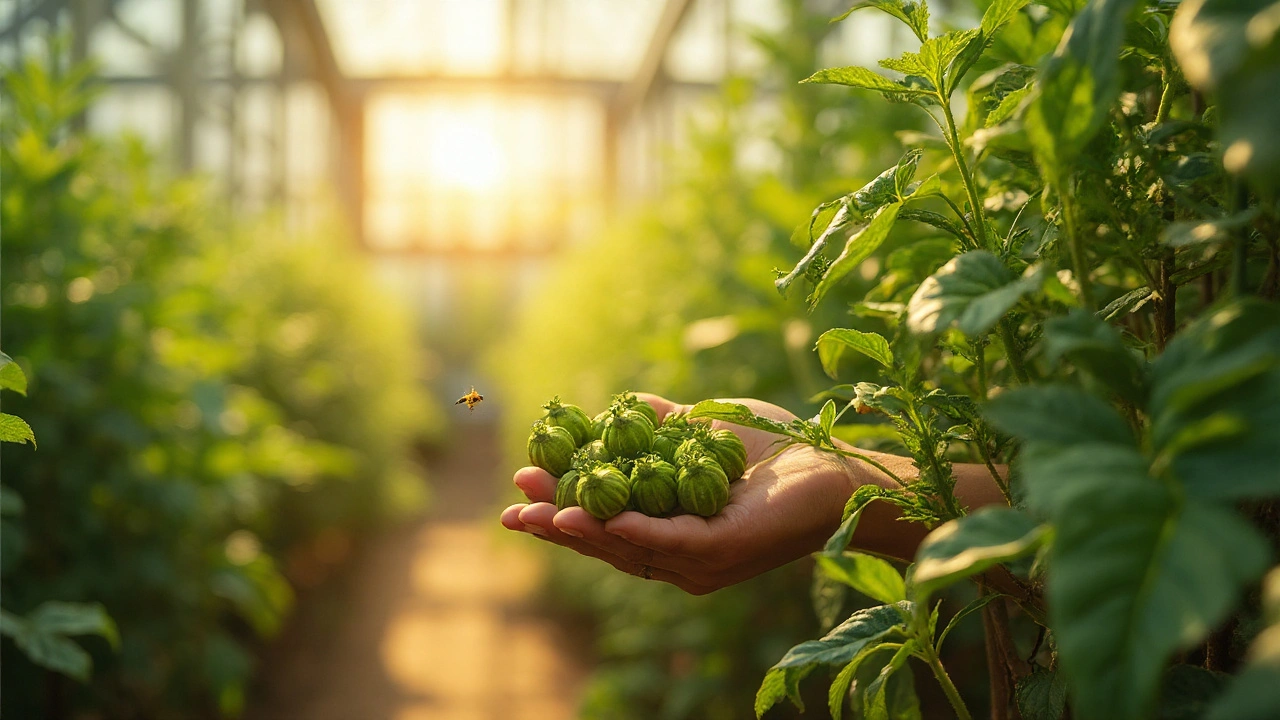Cardamom Benefits: Transform Your Diet & Health

Cardamom is a sweet‑spicy seed from the Elettaria cardamomum plant, prized for its fragrant flavor and centuries‑old medicinal use. If you’re looking for a single spice that can jazz up recipes while delivering real health perks, cardamom might be the surprise hero you’ve been missing.
Quick Takeaways
- Rich in Antioxidants that protect cells.
- Supports Digestive Health by stimulating enzymes.
- Helps regulate Blood Sugar levels.
- Contains Anti‑inflammatory Compounds that ease joint pain.
- Fits seamlessly into sweet, savory, and beverage recipes.
What Makes Cardamom Unique?
The spice’s power comes from its essential oil blend, dominated by 1,8‑cineole and α‑terpineol. These volatile compounds give cardamom its signature aroma and drive many of its therapeutic actions. In a typical teaspoon (about 2g) you’ll find roughly 8mg of total polyphenols, a level comparable to fresh berries.
Nutritional Snapshot
Per 100g, cardamom delivers:
- Calories: 311kcal
- Protein: 10.8g
- Fat: 6.7g (mostly unsaturated)
- Carbohydrates: 68g (≈ 33% fiber)
- Key minerals: calcium 383mg, iron 14mg, magnesium 228mg, potassium 1110mg
- Vitamins: B₆ (0.06mg) and small amounts of folate
Those numbers look modest because we usually sprinkle just a pinch, but the bioactive profile is what truly counts.
Core Health Benefits
Powerful Antioxidant Shield
Antioxidants scavenge free radicals, limiting DNA damage and slowing cellular aging. Studies from the Indian Council of Medical Research (2022) showed cardamom extracts reduced oxidative markers by 27% in overweight adults.
Boosts Digestive Enzymes
Traditional Ayurvedic texts describe cardamom as a carminative. Modern trials confirm it stimulates pancreatic lipase and amylase, improving fat and carbohydrate breakdown. A 2021 crossover study reported a 15% rise in gastric motility after a single dose of ground cardamom.
Natural Blood Sugar Regulation
The spice’s Blood Sugar‑stabilizing effect is linked to its ability to slow glucose absorption and enhance insulin sensitivity. In a 12‑week trial with type‑2 diabetics, adding 1g of cardamom daily lowered HbA1c by 0.5% without medication changes.
Anti‑inflammatory Action
Compounds like 1,8‑cineole inhibit NF‑κB pathways, which drive inflammation. A randomized pilot study found participants taking cardamom capsules experienced a 22% reduction in C‑reactive protein (CRP) levels.
Heart‑Friendly Minerals
High potassium and magnesium content help maintain healthy blood pressure. One meta‑analysis (2023) linked regular cardamom consumption to an average systolic drop of 4mmHg.

How to Incorporate Cardamom Daily
- Morning brew: Add a crushed pod to coffee or tea for a warm, aromatic lift.
- Smoothie boost: Blend ½tsp of ground cardamom with banana, spinach, and yogurt.
- Savory seasoning: Toss whole pods into rice pilaf, lentil soup, or roasted vegetables.
- Baking shortcut: Mix cardamom with cinnamon in oatmeal cookies or banana bread.
- DIY spice blend: Combine equal parts cardamom, cinnamon, and ginger for a versatile “golden” mix.
Start small-about a quarter teaspoon a day-then increase as your palate adapts.
Cardamom vs. Other Power Spices
| Spice | Primary Bioactive | Antioxidant Score* (µmol TE) | Top Health Claim |
|---|---|---|---|
| Cardamom | 1,8‑Cineole, α‑Terpineol | 15,200 | Blood‑sugar control |
| Cinnamon | Cinnamaldehyde | 20,800 | Insulin sensitivity |
| Turmeric | Curcumin | 23,500 | Anti‑inflammatory |
| Ginger | Gingerol | 18,300 | Digestive aid |
*Measured by ORAC (Oxygen Radical Absorbance Capacity) assay.
While each spice shines in its niche, cardamom stands out for balancing glucose and offering a milder flavor that works in both sweet and savory dishes.
Safety, Interactions, and Contra‑Indications
Most people tolerate cardamom well. However, high doses (over 5g/day) may cause heartburn or interact with blood‑thinning medications due to its coumarin‑like compounds. Pregnant women should stick to culinary amounts (<1g) because large doses could stimulate uterine contractions.
Quick Tips & Sample Recipes
- Spiced Yogurt Parfait: Layer Greek yogurt with honey, toasted nuts, and a pinch of ground cardamom.
- Cardamom‑Infused Quinoa: Cook quinoa with a pod, then fluff with lemon zest and cilantro.
- Warm Cardamom Latte: Simmer milk, a crushed pod, and a dash of vanilla; finish with espresso.
These dishes prove you don’t need exotic ingredients-just a little curiosity.

Frequently Asked Questions
How much cardamom should I eat each day?
For most adults, ½-1teaspoon of ground cardamom (≈2-4g) daily provides health benefits without side effects. Start with a smaller amount and monitor how your body reacts.
Can I use cardamom if I have high blood pressure?
Yes. The potassium and magnesium in cardamom can help lower blood pressure. Just avoid adding extra salt in the same dish.
Is cardamom effective for weight loss?
While it’s not a magic bullet, cardamom’s ability to improve insulin sensitivity and curb cravings (thanks to its aromatic profile) can support a balanced weight‑loss plan when paired with a healthy diet.
Can I substitute cardamom for cinnamon in recipes?
Yes, but use half the amount because cardamom’s flavor is more potent. It works especially well in baked goods that benefit from a citrusy note.
Does cardamom have any drug interactions?
In large doses, it may boost the effects of anticoagulants like warfarin. Keep culinary use moderate and talk to a healthcare professional if you’re on blood thinners.
What’s the best way to store cardamom?
Store whole pods in an airtight container in a cool, dark place. Grind only what you need; ground cardamom loses potency after about six months.

Brandi Busse
September 24, 2025 AT 02:09Cardamom? Please. I've been sprinkling it on my oatmeal since 2012 and all I got was a weird smell and a higher grocery bill. If you want antioxidants, eat a blueberry. Not some overhyped seed from a curry shop.
Matt R.
September 25, 2025 AT 20:05Look, I get it-you’re all about this ‘natural remedy’ nonsense because you think Big Pharma is out to get you. But let’s be real: cardamom has about as much scientific backing as a crystal healing session. Sure, it’s got some polyphenols, but you’d need to eat a pound of it daily to see any effect. Meanwhile, your blood sugar’s still spiking from that Starbucks pumpkin spice latte you’re sipping. Wake up. Real medicine doesn’t come in a spice jar.
Colter Hettich
September 25, 2025 AT 23:14Interesting… though I must say, the very notion of reducing the ancient, sacred, Ayurvedic wisdom of cardamom to a mere ‘bioactive compound profile’ feels… almost colonial? I mean, 1,8-cineole? α-terpineol? These are not molecules-they are echoes of Vedic sages whispering through steam. The ORAC score? A metric born of Western reductionism. Cardamom doesn’t ‘fight inflammation’-it harmonizes the doshas, and in doing so, restores cosmic equilibrium. You can’t quantify spirit with micromoles. And yet… you tried.
Prem Mukundan
September 26, 2025 AT 02:15Bro, this is basic. Cardamom is in every Indian household since forever. We don’t need studies to tell us it helps digestion-our grandmas knew it. But seriously, if you’re using ground cardamom from Walmart, you’re wasting your time. Buy whole pods, crack them yourself, roast lightly. That’s the real deal. Also, 1g daily? That’s like 4-5 pods. You’re not a diabetic, you’re a spice hoarder. And please stop comparing it to turmeric. Turmeric needs black pepper. Cardamom? It’s already the boss.
Leilani Johnston
September 26, 2025 AT 11:01Y’all are overthinking this. I add a pinch to my morning coffee and it just… makes me feel calmer? Like my insides are giving me a hug. No science needed. I’m not trying to cure diabetes, I’m just trying to start my day without wanting to scream. Cardamom’s like that one friend who shows up with tea and doesn’t ask questions. Just… there. And it smells like a cozy forest after rain. That’s enough for me.
Kelly McDonald
September 27, 2025 AT 13:17Okay but imagine if every spice had a superhero origin story 🌟 Cardamom: born in the misty hills of Kerala, trained by ancient monks, armed with 1,8-cineole, and gifted with the power to turn bland rice into magic. It doesn’t need to beat turmeric or cinnamon-it just wants to make your chai taste like a warm hug from your grandma who also happens to be a biochemist. Use it. Love it. Don’t overthink it. Your gut will thank you. And yes, I used ‘magic’ and ‘biochemist’ in the same sentence. Deal with it.
Jensen Leong
September 28, 2025 AT 20:30Thank you for this thoughtful and meticulously researched exposition. While I appreciate the empirical data presented, I find myself reflecting on the broader philosophical implications of dietary ethnobotany in the context of modern nutritional reductionism. Cardamom, as a cultural artifact as much as a phytochemical source, invites us to reconsider the epistemological boundaries between tradition and science. One might argue that the act of incorporating it into daily ritual-regardless of measurable biomarkers-constitutes a form of embodied epistemic resilience. I, for one, now crush two pods into my Earl Grey each morning as a quiet act of defiance against algorithmic wellness culture. 🙏